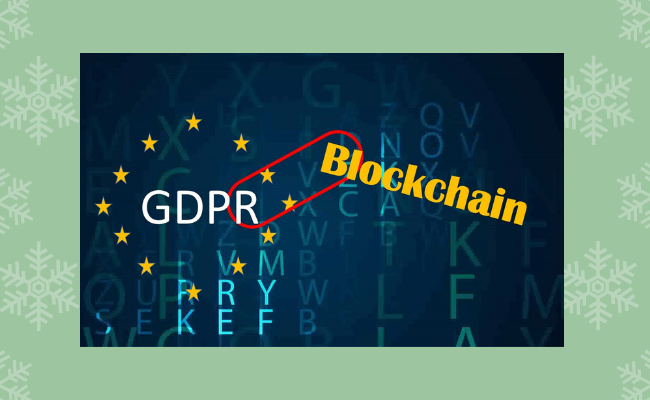The impacts of the GDPR ruling are still unraveling. However, one thing is undeniable — and that numerous companies will find it difficult to apply these new guidelines to the blockchain.
When it comes to data storage, companies that are working in the European Union jurisdiction will have to abide by the following users’ rights:
- Offer crystal clear information regarding the type of data collection and attainment of explicit consumer approval.
- Users should be given the right to access their personal information, make changes in their data or withdraw their permission to use such data.
- Users can inform the companies about the removal of their data from the customer database once the condition for its preservation expires.
Why GDPR is a conundrum for companies.
GDPR is a blessing in disguise for consumers. It allows them to stop organizations from unauthorized data collection and using their information for commercial purposes. Unauthorization is the reason Microsoft might have to pay a hefty amount because of compliance hassles with ProPlus subscription in the Netherlands.
The European Union member country like Finland has already started GDPR clauses in the exact letter and spirit of the ruling. The official authorities have rolled out additional users’ privacy laws including supplemental acts for its citizens. As a result, businesses those who are operating in the region have to face compliance challenges to a certain degree.
The importance of blockchain in GDRP compliance.
The significance of blockchain in different industries like healthcare, supply chain management, and others is increasing day by day. Likewise, the bottom line suggests that blockchain delivers next level security when it comes to storing and processing a large amount of data. Still, you cannot undermine this fact that Blockchain has an immutable nature. Therefore, the said technology has become an obstacle to GDPR regulations.
In terms of legislation, decentralized systems belong to the category of a gray area. Hence, organizations are supposed to cooperate with their customers when it comes to correcting their personal data. If any company has recorded consumers’ data on a public blockchain, they cannot delete it hassle-free. Conversely, it is possible to remove data from a private blockchain, but it takes a lot of efforts.
Blockchain notion is an ideal match for GDPR to a certain degree. Users can protect their rights through legislations. In addition, organizations can secure their customers’ data with the help of technological advances. As a result, companies do not need to store their users’ information through exposable data silos.
Is it possible to develop a GDPR compliant blockchain legally?
The researchers from the University of Cambridge and the Queen Mary University of London have identified a negotiating solution. It is still feasible to apply a new technical solution on private blockchains that will integrate the “right to be forgotten” rule. You may remove decryption keys for some specific entries instead of deleting data from the blockchain. By doing so, data still exists on the ledger, but it becomes impossible to access or decrypt it.
That said, private blockchains need enormous computational resources to achieve the above-described objective. Moreover, companies will have to increase their budgets to acquire such resources. A Japanese company, Nagezini, is developing a blockchain project. Once they have developed the project, online content creators can promote their content. Furthermore, they would be able to receive donations from their audience in NZE tokens.
Without transferring data ownership, companies cannot become GDPR compliant.
There is no denying that Blockchain stores the data in a decentralized way. For example, various Know Your Customer (KYC) processes compel users to offer their personal data for identity verification purpose. Therefore, different Fintech companies are bound to develop new procedures to store and process this crucial information.
In case legislators formulate guidelines for blockchain solutions in a more transparent manner, the process would become understandable for every internet user. Thus, users will not need to share their data with the companies explicitly. They can give permission to access specific information through blockchain.
How Blockchain has made VPN services GDPR compliant?
VPN providers are supposed to comply with GDPR when it comes to holding data of European users. These digital privacy entities have created blockchain based identity management systems to store their users’ data.
Furthermore, they have added Bitcoin and other cryptocurrencies in their online payment mechanism. The above-said initiative by VPN services has taken online privacy of their subscribers to new heights. However, not all the VPNs abide by GDPR guidelines. There are handfuls of best VPN services that follow GDPR in the right direction.
How has Blockchain made E-Commerce industry GDPR compliant?
Online stores have become an essential facet of our daily lives. Likewise, these stores have to rely on users’ data to offer a more personalized shopping experience to their users.
Sadly, there are some downsides related to this industry. Online stores have to collect a massive amount of information in the shape of credit card details, phone numbers, physical addresses, names and so on. Surprisingly, online hackers do not have to look for other sources as they can target databases that are filled with enormous users’ information.
In this scenario, the role of blockchain solutions becomes highly useful. The platform uses the power of decentralization to a significant effect. In return, users do not have to bother about their data vulnerability. Blockchain delivers the required level of online protection and anonymity to users hassle-free.
Wrapping Up
Undoubtedly, blockchain technology can provide desired solutions to businesses in making them GDPR compliant. This way, companies can fulfill the regulators’ demand accordingly. Likewise, they can assure their customers that their data is in safe hands and they will not use it for commercial purpose.
On the other hand, users can trust their favorite brands while providing their personal information to them. The above development suggests a win-win situation for both customers and companies.












